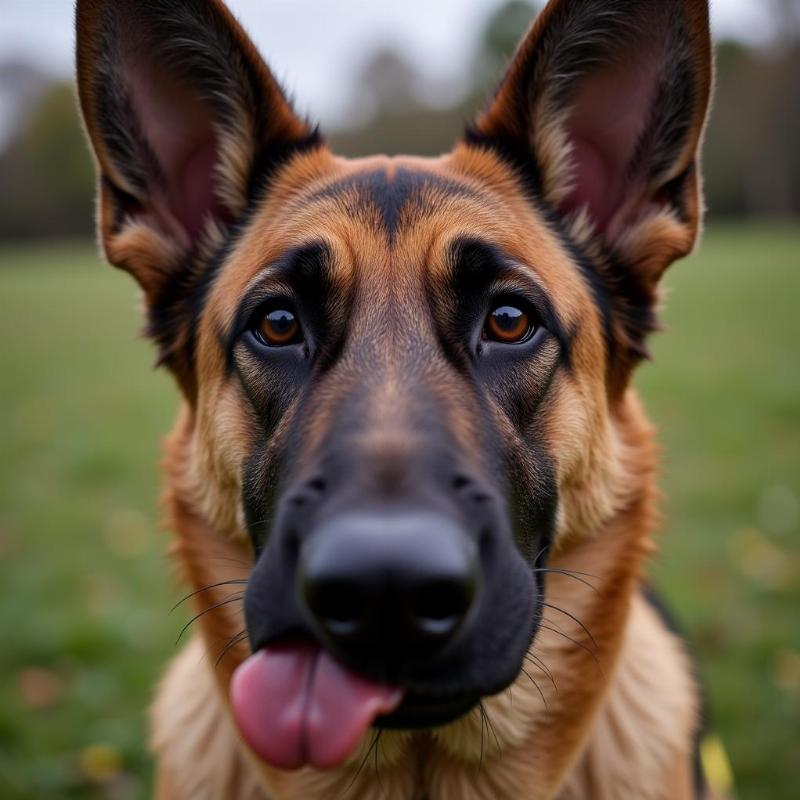Anxiety in German Shepherd dogs is a common concern for owners across the US. These intelligent and loyal companions can experience a range of anxieties, from separation anxiety to noise phobias, impacting their well-being and the harmony of your home. This article will delve into the causes, symptoms, and effective management strategies for anxiety in German Shepherds, empowering you to provide the best possible care for your furry friend.
Recognizing the Signs of Anxiety in Your German Shepherd
Anxiety manifests differently in each dog. However, some common indicators in German Shepherds include excessive barking or whining, destructive behavior like chewing or digging, pacing, panting, trembling, changes in appetite, and avoidance behaviors. Subtle signs like lip licking, yawning, and tucked tails can also signal underlying anxiety. Do you notice your dog exhibiting any of these behaviors in specific situations? If so, it’s important to investigate further.
 German Shepherd Dog Showing Anxiety Signs
German Shepherd Dog Showing Anxiety Signs
Common Causes of Anxiety in German Shepherd Dogs
Several factors can contribute to anxiety in German Shepherds. Genetics plays a role, with some lines more predisposed to anxiety than others. Early socialization is crucial, as a lack of exposure to various sights, sounds, and experiences during puppyhood can increase the risk of anxiety later in life. Changes in routine, such as a new home or the loss of a family member, can also trigger anxiety. Furthermore, negative experiences, like trauma or abuse, can have lasting psychological effects.
Effective Management Strategies for Anxiety in German Shepherd Dogs
Addressing anxiety requires a multifaceted approach. Creating a predictable and stable environment is essential, providing your German Shepherd with a sense of security. Consistent training using positive reinforcement methods can build confidence and reduce anxiety. Mental and physical enrichment through activities like puzzle toys, interactive games, and regular exercise are crucial. do dogs like to be carried Learn more about how interacting with your dog can affect its behavior.
Using Behavioral Modification Techniques
Behavioral modification techniques can help desensitize your German Shepherd to anxiety-inducing stimuli. Gradual exposure to feared situations or objects, paired with positive reinforcement, can help them develop positive associations. Counter-conditioning involves teaching your dog a different behavior, like sitting or focusing on a toy, in the presence of the anxiety trigger. dogs for rehoming north west Explore rehoming options if you’re facing challenges with your dog’s anxiety.
Considering Medication and Supplements
In some cases, medication prescribed by a veterinarian can be beneficial in managing anxiety, particularly when combined with behavioral modification. Certain supplements, such as pheromones or calming herbs, may also provide some relief. It’s essential to consult with your veterinarian before administering any medication or supplements to your German Shepherd.
Creating a Calm and Enriching Environment for Your Anxious German Shepherd
A calming environment can significantly reduce anxiety levels. Providing a safe space, like a crate or den-like area, can offer comfort. Playing calming music or using pheromone diffusers can create a soothing atmosphere. king shepherd dog for sale Consider different breeds if anxiety is a major concern. Maintaining a consistent daily routine, with regular feeding, exercise, and playtime, provides predictability and reduces stress.
Conclusion: Supporting Your German Shepherd Through Anxiety
Anxiety in German Shepherd dogs is manageable with patience, understanding, and the right approach. By recognizing the signs, understanding the causes, and implementing effective strategies, you can significantly improve your dog’s well-being and strengthen your bond. places that take aggressive dogs Find resources for aggressive dog behavior if needed. Remember that seeking professional guidance from a veterinarian or certified dog trainer is crucial for a tailored plan to address your German Shepherd’s specific needs.
FAQ:
- How can I tell if my German Shepherd is anxious? Signs include excessive barking, destructive behavior, panting, trembling, and avoidance behaviors.
- What are common causes of anxiety in German Shepherds? Genetics, lack of socialization, changes in routine, and negative experiences can contribute to anxiety.
- How can I treat my German Shepherd’s anxiety? Create a stable environment, use positive reinforcement training, provide mental and physical enrichment, and consider behavioral modification techniques.
- Should I give my German Shepherd medication for anxiety? Consult with your veterinarian to determine if medication or supplements are appropriate for your dog’s specific situation.
- How can I create a calming environment for my anxious German Shepherd? Provide a safe space, play calming music, use pheromone diffusers, and maintain a consistent daily routine.
- When should I seek professional help for my German Shepherd’s anxiety? If your dog’s anxiety is severe or impacting their quality of life, consult a veterinarian or certified dog trainer.
- Can anxiety in German Shepherds be cured? While anxiety may not be entirely cured, it can be effectively managed with the right strategies and support.
Beautdogs.us is your premier online destination for comprehensive and reliable information on dog care, breeds, and products in the US. We cater to both novice and seasoned dog owners, offering expert advice on everything from puppy training to senior dog care. Our passion is helping you build a stronger bond with your canine companion. Contact us at [email protected] or +1 501-555-7529 for more information. Visit Beautdogs.us today!